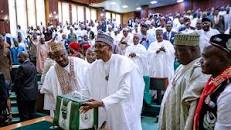President Muhammadu Buhari has said that the Federal Government will continue to pursue its dream of lifting 100 million Nigerians out of poverty by 2030 agenda by prioritizing poverty-reduction projects, programmes and initiatives in yearly budgets’ funding.
Buhari made the promise on Thursday while launching the ‘2022 Multidimensional Poverty Index (MPI) Survey Report’ published by the National Bureau of Statistics (NBS) in Abuja.
The President, who was represented by the his Chief of Staff, Prof. Ibrahim Gambari, at the forum, the President recalled the sundry initiatives undertaken by his administration over the past few years to address poverty, stressed that despite challenges at the domestic and global levels, especially the Covid-19 pandemic impact and the achievements recorded since then through the implementation of the programmes.
He promised that in order to consolidate on the gains, the government would use the MPI results to allocate funds to poverty-reduction programmes in yearly budgets.
Buhari stressed: “We are more than ever committed to lifting 100 million Nigerians out of poverty through improved investments in people oriented programmes. Going forward we are going to use this MPI result as a policy tool for targeted resource allocation.”
According to him, in 2019, the Federal Government made a commitment to deploy the use of MPI in understanding poverty issues across multiple dimensions at the United Nations General Assembly- UNGA, where it announced the adoption of this global poverty measurement methodology to track the Presidential ‘100 million out of poverty’ mandate.
Subsequently, the President explained that the government invited the developers of the MPI- the Oxford Poverty and Human Development Initiative (OPHI), to Nigeria in November of same year to discuss the modalities, adding that following this, the National Bureau of Statistics (NBS), in collaboration with the UNICEF, UNDP, United Nations and other partners and country conducted the 2022 MPI Survey Report.
Buhari described the launching of the MPI Survey Report as just the start as the government had now deployed a comprehensive Data Demand and Use (DDU) strategy to embed the use of evidence-based and data driven poverty reduction mechanisms.
To begin this deployment of the data, the President spoke on some reasons why the 2022 MPI Report remained a powerful tool to galvanise the kind of action that will push the government forward to achieve the Presidential mandate of lifting 100 million out of poverty, within the next decade.
Specifically, he spoke on using the MPI identifying a set of deprivations that a person experiences at the same time and that using the disaggregation to show the vast range in the levels of poverty, we can see the precise needs for each state or senatorial district, which will allow policymakers at that level take appropriate action, adding that as a post-pandemic data, the MPI will be integrated within the National Social Register- the government’s largest databank on the poor and vulnerable.
The 2021/2022 MPI Survey was conducted by the statistics agency to provide essential data to compute the MPI for the country with sufficient disaggregation to guide local poverty policy formulation and implementation by the governments at all levels.






